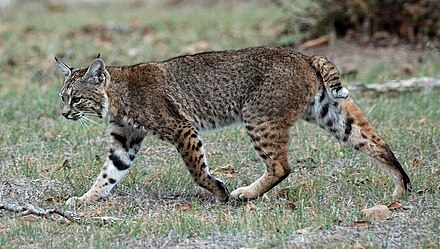The New Mexico Department of Health (NMDOH) Scientific Laboratory Division has confirmed that two bobcats, one in Grant County and one in Sierra County, have tested positive for rabies.
Source: NM Department of Health (Photo: Courtesy Wikipedia)
One bobcat attacked a man near his house in Grant County. The man is now receiving shots to prevent him from getting rabies. A dog in Sierra County was attacked by the second bobcat; the dog was up to date on his rabies vaccine, and his condition will be monitored for 45 days.
Animal rabies cases in New Mexico usually occur in wild animals like skunks, bats and foxes. Three rabid bobcats were identified in 2022, one in Catron County and two in Grant County.
Rabid wild animals may show no fear of people and be aggressive, or they may be quiet and appear tame. If you see a sick wild animal, or a wild animal acting abnormally, report it to your local animal control officer or your local New Mexico Department of Game and Fish game warden at https://www.wildlife.state.nm.us/download/enforcement/NMDGF-Conservation-Officer-Map-12-21-2023.pdf.
“State law requires all dogs and cats be vaccinated against rabies, a deadly viral disease that can be prevented but not cured,” said State Public Health Veterinarian Erin Phipps, DVM, MPH. “Unvaccinated pets exposed to a rabid animal must either be euthanized or put into strict isolation for four months to prevent them from exposing people to rabies.”
The NMDOH recommends the following to keep you and your family safe from rabies:
- Always keep pets on a leash. Pets should be up to date on rabies vaccinations and wearing current license tags on their collar. If your cat or dog has been bitten or scratched, especially by a wild animal, call your pet’s veterinarian even if the wound is superficial.
- Horses and other livestock should also be considered for rabies vaccination to protect them from rabid animals that may attack them.
- Stay away from wild or unfamiliar animals. Do not attempt to feed, approach or touch wild animals (alive or dead). Teach this important message to your children and always keep a close eye on your children.
- If you or someone you know is bitten by an animal, or comes into contact with an animal’s saliva, wash the exposed site immediately with soap and water. Be sure to report the bite to local animal control and seek medical care as soon as possible.
- If you or your pets are bitten or otherwise exposed to the saliva of wild animals, seek medical care immediately and contact the NMDOH Helpline at (833) SWNURSE or (833) 796-8773.
For more info about rabies see the New Mexico Department of Health website at: https://nmhealth.org/about/erd/ideb/zdp/rab/.






